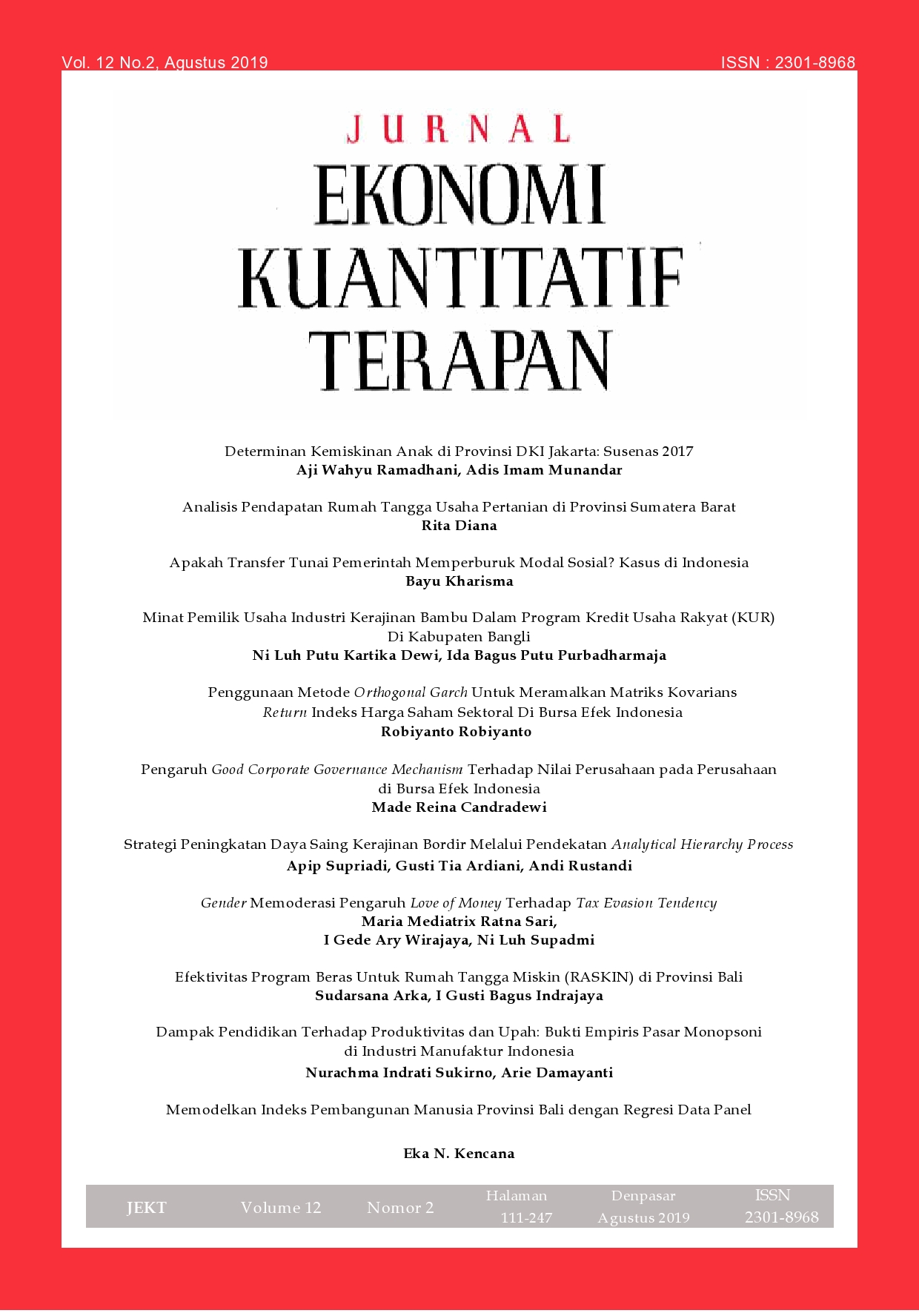Efektivitas Program Beras Untuk Rumah Tangga Miskin (RASKIN) di Provinsi Bali
Abstract
Penelitian ini bertujuan untuk mengevaluasi efektivitas pelaksanaan program beras untuk rumah tangga miskin (RASKIN) yang ada di Provinsi Bali. Program RASKIN merupakan salah satu program pengentasan kemiskinan yang diberlakukan secara reguler oleh pemerintah. Rumah tangga miskin yang menjadi sasaran program ini tidak langsung mendapat jatah beras secara gratis, namun masih harus membayar sejumlah uang untuk mendapatkan beras dengan harga yang relatif murah. Proses penyaluran beras yang tidak langsung ini banyak mendapat kritikan karena berpotensi akan menimbulkan salah sasaran (mistarget). Penelitian ini lebih fokus pada evaluasi dampak Program RASKIN terhadap tingkat kesejahteraan rumah tangga yang diukur dari indikator pendapan rumah tangga serta pengeluaran rumah tangga. Data yang dikumpulkan berasal dari survei terhadap kurang lebih 500 responden yang berasal dari berbagai daerah di Provinsi Bali. Hasil penelitian menemukan bahwa rumah tangga yang mendapatkan Program RASKIN ternyata memiliki pendapatan serta pengeluaran yang lebih tinggi. Jika tingkat kesalahan target program ini diasumsikan sangat kecil, maka Program RASKIN dapat dikatakan memiliki pengaruh yang positif terhadap tingkat kesejahteraan.
Downloads
References
Barret, C. (2002). Food Aid Effectiveness: It's targeting, stupid. New York: Departement of Applied Economics and Management, Cornell University.
Barret, C., & Maxwell. (2005). Food Aid After Fifty Years: Recasting its Role. London: Routledge.
Blundell, R., & MaCurdy, T. (2000). Labor Supply: A Review of Alternative Approaches. Dalam D. Ashenfelter, & D. Card, Hanbook of Labor Economics (hal. 1559-1695). Amsterdam: North-Holland.
Dercon, S., & Krishnan, P. (2003). Risk Sharing and Public Transfers. Econoomic Journal , 113, C86-C94.
Gerardi, K., & Tsai, Y. (2010). The Effect of Social Entitlement Programs on Private Transfers: New Evidence of Crowding Out. Atlanta: Federal Reserve Bank of Atlanta.
Gilligan, D. O., & Hoddinott. (2007). Is there Persintence in Impavt of Emergency Food Aid? Evidence on Consumption, Food Security and Assets in Rural Ethiopia. American Journal of Agricultural Economics , 89, 225-242.
Kang, S. J. (2004). Are Private Transfer Crowded-out by Public Transfer?: The Case of Nepal. The Developing Economies , XLII-4, 510-528.
Kang, S. J., & Suwada, Y. (2003). Are Private Transfers Altruistically Motivated? The Case of Republic of Korea Before and During the Financial Crisis. The Developing Economies , XLI-4, 484-501.
Khander, S. R., Koolwal, G. B., & Samad, H. A. (2010). Handbook on Impact Evaluation, Quantitative Methods and Practices. Washington DC: The World Bank.
Lal, D., & Sharma, A. (2009). Private Household Transfers and Poverty Alleviation in Rural India: 1998-99. The Journal of Applied Economic Research , 97-112.
Lentz, E. (2003). Annotated Bibliography of Food Aid Disincentive Effect. New York: Cornell University.
Mawardi, S. (2008). Efektivitas Pelaksanaan Raskin. Jakarta: SMERU.
Nielsen, M. E., & Olinto, P. (2007). Do Conditional Cash Transfers Crowd-out Private Transfers?: Evedence from Randomize Trials in Honduras and Nicaragua. Washington: World Bank .
Quartey, P. (2006). Migrant Remittances and Household Welfare in Times of Macro-Volatility: The Case of Ghana. ISSER University of Ghana Legon .
Sahn, D. E., & Alderman, H. (1996). The Effect of Food Subsidies on Labor Supply in Sri Lanka. Economic Development and Cultural Change , 45, 125-145.
Skoufias, E., Unar, M., & Gonzales, T. (2008). The Impact of Cash and In-kind Transfers on Consumption and Labor Supply. Washington: World Bank.
Sulaiman, M. (2010). Incentive and Crowding-out Effects of Food Assistance: Evidence from Randomized Evaluation of Food-for-Training Project in Southern Sudan. London: Economic Organisation and Public Policy Programme.
Tadesse, G., & Shively, G. (2009). Food Aid, Food Prices and Producer Disincentive in Ethiopia. American Journal of Agricultural Economics , 91, 942-955.




















